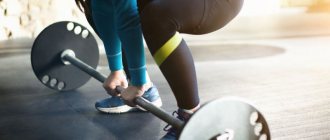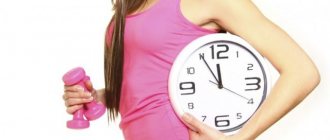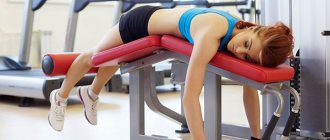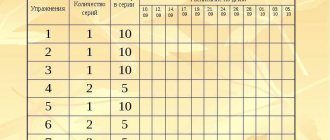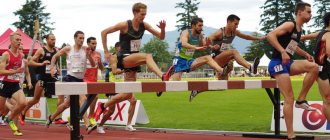Every person who starts doing fitness at some point asks the question: What is the best time to train? This question depends on many factors, but we will try to answer it as clearly and accessible as possible.
I would like to note that everyone who has pulled himself together and is involved in any kind of sport is already on the right path, and it does not matter what time of the day he practices. The main thing is that he does it! You need to understand that even after reading our recommendations, you yourself choose the training time in accordance with your busy schedule and your desire.
Scientists have proven that the best time to train in the gym is 4-5 hours in the afternoon (Based on a scientific study published in the journal “Sports Medicine”). But who said that you can’t study at other times? Let's look at the pros and cons of training at different times of the day.
What determines the training time?
First of all, it is worth talking about such a concept as circadian rhythms. These are the internal states of our body that transform during the day. For example, body temperature is known to fluctuate from 36°C in the morning to 37°C towards night. In addition, the level of cortisol in the blood varies. This is a hormone that mobilizes the body's strength during stress or heavy exertion. Its indicator, on the contrary, decreases in the evening.
These and many other indicators, such as fluctuations in pressure, pulse, heart rate, affect our efficiency at different times of the day, and according to circadian rhythms, people are divided into “night owls” and “larks”.
I should exercise in the morning when:
- I work until late at night and am very tired. By working out in the morning, you can be sure that no work, family matters or fatigue will interfere with your workout.
- I do not get enough sleep. For sound sleep, you should avoid physical activity at least 2 hours before going to bed.
- When I wake up, I feel exhausted. Exercise is a great way to cheer up.
- I get up early and go to bed early. Morning workouts are great for early risers. At this time, your body independently prepares for the load.
CONCERNING NUTRITION AFTER TRAINING MASS/DRYING
Post-workout nutrition depends on goals and time, i.e. if you trained in the MORNING and you are in the MASS GAINING phase (your goal is to build muscle), then immediately after training you can drink BCAA amino acids, if they are not there, then just water, and be sure to absorb a copious amount of PROTEIN + COMPLEX CARBOHYDRATES 30 minutes after strength training (fiber itself). Well, subsequent meals B+U+fiber+water every 2 hours. Before bed, casein protein or cottage cheese. Well, I’m telling you everything briefly, if you need details, then read articles about nutrition on my blog.
If you trained in the EVENING (at 17-18-19-20-21) and you are in the MASS GAIN phase (the goal is to pump up muscles), then I would still recommend you BCAA after training (if they are not there, then water) + 30 minutes after strength training = plenty of protein + complex carbohydrates. And before bed, cottage cheese or casein. prot.
If we are talking about WEIGHT LOSS (BURNING EXCESS FAT), then the recommendations are as follows:
If you trained in the MORNING, then I would not eat any carbohydrates after training in the NEAR TIME! I would eat only protein + fiber (in small quantities)! Those. after training I would drink BCAA, and then after 30 minutes I would eat some other protein (normal from food, for example, fish, chicken, beef, eggs) + fiber. And then after 2 hours I would make a meal with CARBOHYDRATES (complex) + protein + fiber.
If you trained IN THE EVENING, then I would not eat any carbohydrates AT ALL! Only protein + fiber (in a small amount)! Those. after training I would drink BCAA, and then after 30 minutes I would eat some other protein (normal from food, for example, fish, chicken, beef, eggs) + fiber. And before bed, either cottage cheese or casein protein, and then go to sleep.
I should work out during the day when:
- I work in an office. Sitting all day will clearly not benefit your body. You can take sports breaks in the middle of the working day.
- In the morning it’s hard for me to wake up earlier, and in the evening I don’t have enough energy. Then this kind of training is ideal. Of course, if your work schedule allows it.
- I want to increase my strength and gain muscle mass. It is believed that an increase in body temperature in the afternoon promotes training for precisely these purposes.
Important!
You shouldn't exercise right after lunch; give your stomach at least a couple of hours to digest the food.
What do statistics and research show?
American scientists directly link training time to a person’s physique:
- Endomorphs (slow metabolism, excess body weight) should exercise in the morning to activate metabolic processes.
- For ectomorphs (low weight and fast metabolism), evening exercises are suitable for gaining muscle mass.
At the same time, specialists from Wilmsburg, having conducted an experiment on people without sports training, proved the benefits of evening exercise due to the increased speed of muscle contraction. However, all researchers agree on one thing: the only thing worse than choosing the wrong time for sports is their complete absence.
I should study in the evening when:
- After a working day I feel a surge of energy. Often in the organisms of “owls” everything works the other way around. For example, body temperature decreases in the evening, as a result of which performance increases.
- I want to relax. The evening is great for yoga, light aerobics and stretching.
- I want to develop flexibility. The time from 16:00 is considered the most suitable for such training. During these hours, your endurance is high and your muscles are better warmed up.
But don’t forget about the possibility of training at night. Moreover, more and more fitness clubs are switching to 24-hour operating hours.
RECOMMENDATION FOR THOSE WHO ARE LOSSING WEIGHT (BURNING FAT)
I definitely wouldn’t do strength training in the morning on an empty stomach.
But cardio training on an empty stomach is just the thing. In general, cardio training for weight loss is useful in three cases: IN THE MORNING ON AN EAST SCHATCH, AFTER STRENGTH TRAINING, and possibly before bed. For more information about why this is so, read the main article: “How and when to do cardio for fat burning.”
But doing strength training IN THE MORNING but not on an empty stomach is POSSIBLE! But, to be honest, I wouldn’t, because in the morning when a person wakes up and doesn’t eat anything, it’s best to do CARDIO. And then at lunch or in the evening strength training. And after it, cardio again)). This will be more effective than doing both STRENGTH AND CARDIO in the morning. BUT IT IS POSSIBLE!
The most important thing, even at the stage of losing weight (burning fat) before strength training, is to take a full meal one hour, consisting of PROTEIN + COMPLEX CARBS + FIBER. Here is the main recommendation.
I should study at night when:
- I prefer speed and strength training. It is believed that such loads “work for you” in the afternoon and until midnight.
- I am an absolute night owl, I sleep until lunchtime and get more active at night. Doctors, coaches and professional athletes do not see anything wrong with night training, which means you can exercise when you feel comfortable.
- My sexual desire increases at night. They say that this is the surest way to monitor the release of testosterone, which is responsible not only for libido, but also for physical activity.
And in order for you to try classes at different times of the day and decide for yourself what suits you best, fitness clubs decide to experiment. For example, for those who like to train late in the day, Crocus Fitness
held
a “Fitness Night”
, where from 14:00 until midnight you could try yoga, Pilates, aerobics, salsa, crossfit and even Thai boxing, and also determine what time is most comfortable for you to train.
When is the best time to exercise to lose weight?
The majority are in favor of “shooting” early, even before work, and in the evening to do household chores or relax, rather than rush headlong to the gym or stadium. However, the desire to work out early in the morning is challenged by a much stronger desire to sleep an extra half hour or hour. It most often wins, which is why most athletes still train in the evenings.
This especially applies to residents of large cities with their constantly accelerating pace of life, forcing them to save every minute, and their ever-increasing workloads.
Gradually, evening training began to be considered the most appropriate in sports science, although no one has conducted any special research on this matter.
However, Peter Hespel, a professor at the Sports Research Center at the Catholic University of Leuven in Belgium, as befits a real scientist, decided to test this statement and conducted an interesting experiment.
Peter Hespel invited 28 young and healthy guys under 21 years of age to participate in his study. All of them had to switch to a high-calorie diet proposed by scientists for six weeks. Everyone was fed the same. For all volunteers, the daily calorie intake increased by 30%. At the same time, they ate 50% more fat than in everyday life before participating in the experiment.
Study participants were divided into three groups. Those who were in the first group were allowed to forget about training and going to the gym for the duration of the experiment. The remaining two groups trained. Moreover, volunteers from the second group went out for training first thing in the morning, as soon as they woke up, and the third group did it after a breakfast rich in carbohydrates. Those who exercised on an empty stomach ate exactly the same breakfast, but only after training. The training in both groups was absolutely identical in duration and load.
A month and a half later, scientists summed up the results. As you might guess, those who only ate and did not exercise gained weight, on average approx. 2 kg each. Those who exercised after breakfast also gained weight, but significantly less - a little more than 1 kg.
Weight did not change only among those participants in the experiment who trained on an empty stomach, before breakfast. It turned out that their bodies burned more calories throughout the day. In addition, they had better insulin levels.
Of course, it is premature to draw far-reaching conclusions based on this study alone. It was short-term in nature and too few volunteers participated in it, who were also of the same gender and age. It is also noteworthy that those who trained on an empty stomach did not lose weight, but only managed to maintain the same weight.
Yet the Belgian study may have provided some food for thought for the first time on the question of when is it best to exercise: in the morning or in the evening, when fed or on an empty stomach?
Professor Peter Hespel is confident that he has answered this question.
“The optimal strategy for preventing weight gain,” he says, “should be a combination of a healthy, well-balanced diet and a physically active lifestyle. At the same time, it is better to exercise in the morning and on an empty stomach.”
On the one hand, training at an earlier time will help you burn calories effectively, and on the other hand, it will set the body’s operating mode for maximum fat burning for the entire coming day.
Professor Hespel clearly explains the main reason that helps to lose extra pounds most intensively during morning workouts or at least protect the body from gaining them. To get energy for exercise, the body has to go into the pantries where it stores fats for emergencies like this. The difference from the exact same process of burning fat and calories at other times of the day and especially in the evening is that the body treats this “NZ” very carefully. First of all, it always burns what it received after the last meal, i.e. breakfast, lunch or dinner.
A study conducted in America also helps answer the question of why training time is so important.
Two groups of men ran on a treadmill until they burned 400 calories, the equivalent of a small snack such as 3-4 pieces of toast.
At the same time, those who were part of the first group ran on an empty stomach, and volunteers from the second group were given a bowl of oatmeal with an energy value of 400 calories an hour before training.
Runners in both groups burned fat. Their body received a setting for accelerated fat burning even after training. But results on both measures were higher among those who skipped a pre-workout meal. In other words, exercising after a long break from eating can set the body up to burn fat longer and more intensely.
There is another advantage to morning exercise, which also helps you lose extra pounds more intensively. This is daylight.
One recent study found that people who were exposed to bright sunlight within two hours of waking up were slimmer and lost weight more easily than those who did not receive natural light, regardless of what or how much they ate.
When choosing between the desire to lose weight and sleep an extra hour early in the morning, you should also keep in mind that fans of early workouts have even created something like a proverb: “He who gets up early lives slim!”


